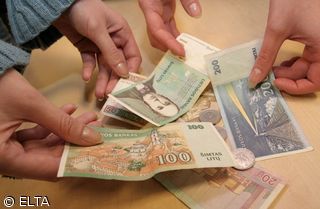The main Hungarian and Polish energy companies have taken the first step toward what would be Central and Eastern Europe's largest merger
Published:
22 November 2003 y., Saturday
The main Hungarian and Polish energy companies have taken the first step toward what would be Central and Eastern Europe's largest merger. The Hungarian Oil and Gas Company, MOL (Magyar Olay es Gazipari), says it has signed a memorandum of understanding with Poland's oil and gas giant PKN (Polski Koncern Naftowy Orlen).
In a statement, MOL says the two companies believe the move toward a merger will enable them to compete more effectively with major global energy companies.
Budapest-based analyst Tamas Kiss of the Platts company, the world's largest information provider on energy, says the firms have been concerned about a possible hostile takeover by a foreign company.
"This is the biggest merger in Central and Eastern Europe," he said. " And to have competition against the big players like Shell and other multi-nationals in the region here, MOL has definitely got to have this merger. And MOL in itself is worth about $3 billion. PKN in itself is quite a big company. The company is worth about $5 billion. So, together, being almost $8 billion, it would be a significant, big company."
Hungarian Prime Minister Peter Medgyessy and his Polish counterpart Leszek Miller, who both attended the signing ceremony in Warsaw, say they, too, want a strong regional energy company.
The Polish government has a 28 percent stake in PKN, while Hungary holds 23 percent in MOL through its privatization agency.
But analyst Tamas Kiss says the governments of Hungary and Poland will soon lose what is called their golden shares in the companies - the power to veto decisions - when the countries join the European Union in May of next year.
Šaltinis:
voanews.com
Copying, publishing, announcing any information from the News.lt portal without written permission of News.lt editorial office is prohibited.
The most popular articles
 According to the data presented by the Ministry of Finance, in end-January central government debt made up LTL26, 310.8 million or 28% of projected GDP for 2010 (LTL 93, 819 million).
more »
According to the data presented by the Ministry of Finance, in end-January central government debt made up LTL26, 310.8 million or 28% of projected GDP for 2010 (LTL 93, 819 million).
more »
 As far as countries affected by the economic crisis, China fared extremely well.
more »
As far as countries affected by the economic crisis, China fared extremely well.
more »
 The European Commission has authorised today a Slovak scheme with a budget of approximately €3.32 million which aims at supporting farmers in Slovakia who encounter difficulties as a result of the current economic crisis.
more »
The European Commission has authorised today a Slovak scheme with a budget of approximately €3.32 million which aims at supporting farmers in Slovakia who encounter difficulties as a result of the current economic crisis.
more »
 Commission sets out a 10-year strategy for reviving the European economy, casting a vision of ‘smart, sustainable, inclusive' growth rooted in greater coordination of national and European policy.
more »
Commission sets out a 10-year strategy for reviving the European economy, casting a vision of ‘smart, sustainable, inclusive' growth rooted in greater coordination of national and European policy.
more »
 The European Commission has launched today the Europe 2020 Strategy to go out of the crisis and prepare EU economy for the next decade. The Commission identifies three key drivers for growth, to be implemented through concrete actions at EU and national levels.
more »
The European Commission has launched today the Europe 2020 Strategy to go out of the crisis and prepare EU economy for the next decade. The Commission identifies three key drivers for growth, to be implemented through concrete actions at EU and national levels.
more »
 Launching of the “SCHOOLS’ initiative for innovation and changes” Grant scheme.
more »
Launching of the “SCHOOLS’ initiative for innovation and changes” Grant scheme.
more »
 EU Member States must not only deliver on their international aid pledges, but also bring in a financial transactions tax and a temporary debt moratorium, to help developing countries to cope with the effects of the global financial and economic crisis, said the Development Committee on Monday.
more »
EU Member States must not only deliver on their international aid pledges, but also bring in a financial transactions tax and a temporary debt moratorium, to help developing countries to cope with the effects of the global financial and economic crisis, said the Development Committee on Monday.
more »
 The EBRD is increasing its commitments to promote sustainable energy projects in Slovakia with a new €90 million funding under the existing Slovakia Sustainable Energy Finance Facility (SLOVSEFF) to ensure continuous implementation of energy efficiency and small renewable energy projects.
more »
The EBRD is increasing its commitments to promote sustainable energy projects in Slovakia with a new €90 million funding under the existing Slovakia Sustainable Energy Finance Facility (SLOVSEFF) to ensure continuous implementation of energy efficiency and small renewable energy projects.
more »
 According to the unaudited data, in 2009 AB Bank SNORAS earned LTL 8.7 million profit. The bank’s assets grew by 11 per cent up to LTL 6.342 billion during 2009 and were by LTL 647.8 million larger than at the beginning of 2009.
more »
According to the unaudited data, in 2009 AB Bank SNORAS earned LTL 8.7 million profit. The bank’s assets grew by 11 per cent up to LTL 6.342 billion during 2009 and were by LTL 647.8 million larger than at the beginning of 2009.
more »
 Aviation security measures that go beyond common EU requirements should be paid for by Member States, not by passengers, said Transport Committee MEPs in a vote on Monday that could put Parliament on a collision course with the Council of Ministers.
more »
Aviation security measures that go beyond common EU requirements should be paid for by Member States, not by passengers, said Transport Committee MEPs in a vote on Monday that could put Parliament on a collision course with the Council of Ministers.
more »